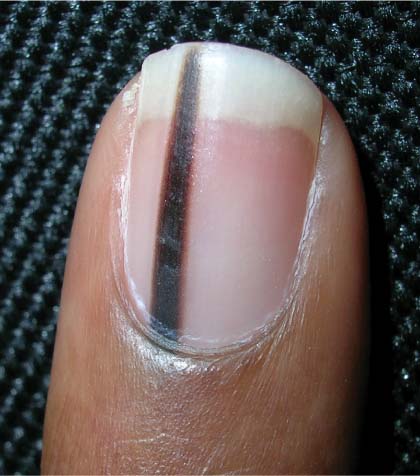User login

The physician recognized this pigmented band as longitudinal melanonychia (LM), but was concerned about the cause. LM may involve one or several digits and vary in color (light brown to black) and width (2-4 mm). LM is more common in more darkly pigmented individuals.
LM can be caused by chronic trauma, nevi, certain drugs, and endocrine disorders. Subungual melanoma, a rare tumor that can be lethal if it goes undetected, must always be considered in patients with LM.
In this case, the physician performed a biopsy of the nail matrix, which revealed that this was a benign nevus, and not a subungual melanoma.
Photos and text for Photo Rounds Friday courtesy of Richard P. Usatine, MD. This case was adapted from: Mayeaux EJ. Pigmented nail disorders. In: Usatine R, Smith M, Mayeaux EJ, et al, eds. The Color Atlas of Family Medicine. New York, NY: McGraw-Hill; 2009:822-825.
To learn more about The Color Atlas of Family Medicine, see:
• http://www.amazon.com/Color-Atlas-Family-Medicine/dp/0071474641
You can now get The Color Atlas of Family Medicine as an app for mobile devices including the iPhone and iPad by clicking this link:

The physician recognized this pigmented band as longitudinal melanonychia (LM), but was concerned about the cause. LM may involve one or several digits and vary in color (light brown to black) and width (2-4 mm). LM is more common in more darkly pigmented individuals.
LM can be caused by chronic trauma, nevi, certain drugs, and endocrine disorders. Subungual melanoma, a rare tumor that can be lethal if it goes undetected, must always be considered in patients with LM.
In this case, the physician performed a biopsy of the nail matrix, which revealed that this was a benign nevus, and not a subungual melanoma.
Photos and text for Photo Rounds Friday courtesy of Richard P. Usatine, MD. This case was adapted from: Mayeaux EJ. Pigmented nail disorders. In: Usatine R, Smith M, Mayeaux EJ, et al, eds. The Color Atlas of Family Medicine. New York, NY: McGraw-Hill; 2009:822-825.
To learn more about The Color Atlas of Family Medicine, see:
• http://www.amazon.com/Color-Atlas-Family-Medicine/dp/0071474641
You can now get The Color Atlas of Family Medicine as an app for mobile devices including the iPhone and iPad by clicking this link:

The physician recognized this pigmented band as longitudinal melanonychia (LM), but was concerned about the cause. LM may involve one or several digits and vary in color (light brown to black) and width (2-4 mm). LM is more common in more darkly pigmented individuals.
LM can be caused by chronic trauma, nevi, certain drugs, and endocrine disorders. Subungual melanoma, a rare tumor that can be lethal if it goes undetected, must always be considered in patients with LM.
In this case, the physician performed a biopsy of the nail matrix, which revealed that this was a benign nevus, and not a subungual melanoma.
Photos and text for Photo Rounds Friday courtesy of Richard P. Usatine, MD. This case was adapted from: Mayeaux EJ. Pigmented nail disorders. In: Usatine R, Smith M, Mayeaux EJ, et al, eds. The Color Atlas of Family Medicine. New York, NY: McGraw-Hill; 2009:822-825.
To learn more about The Color Atlas of Family Medicine, see:
• http://www.amazon.com/Color-Atlas-Family-Medicine/dp/0071474641
You can now get The Color Atlas of Family Medicine as an app for mobile devices including the iPhone and iPad by clicking this link: